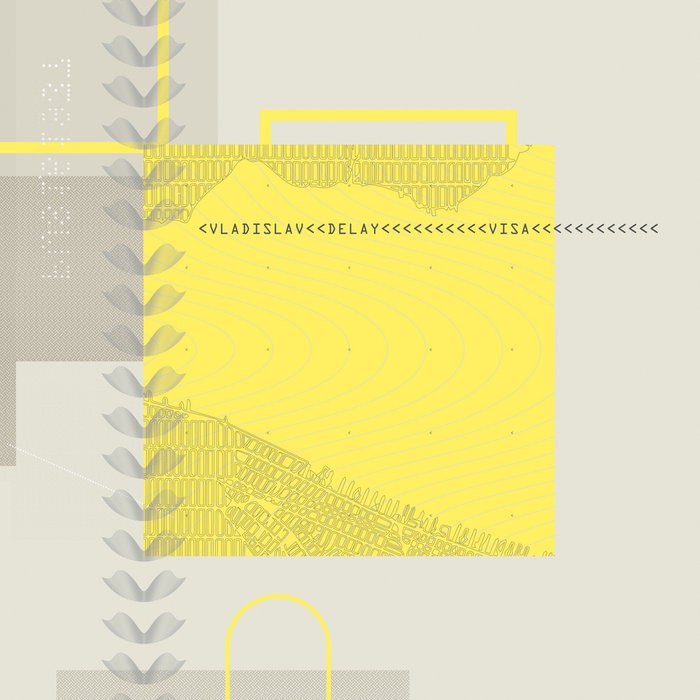REVIEW: VLADISLAV DELAY - VISA
5 NOVEMBER 2014
REVIEW: VLADISLAV DELAY - VISA
5 NOVEMBER 2014
REVIEW: VLADISLAV DELAY - VISA
5 NOVEMBER 2014

There was a time in electronic music before 120bpm 4/4 dancing. I don't mean way back when DJs worked out how to blend disco tracks together so that the loose hips of the 1970s could gyrate without dropping the beat all night in those sleazy gay night clubs where techno emerged. I mean right back in the past, before Roland had produced a drum machine, and before Pink Floyd had touched a mini moog. It started with blips and scrapes oozing out of the ether. Early minds heard the future as these pulsing sounds evolved into something composible.
Italian futurist Balilla Pratella discussed the artistic possibilities of sound in his Technical Manifesto of Futurist Music (1911): "To present the musical soul of the masses, of the great factories, of the railways, of the transatlantic liners, of the battleships, of the automobiles and airplanes. To add to the great central themes of the musical poem the domain of the machine and the victorious kingdom of Electricity." One of these electronic futures was recording – and the technologies that evolved to capture and reproduce music were also used in composition itself, especially in the French avant garde's musique concrète, such as Pierre Schaffer's Etude aux chemins de fer (1948).
Dominating the field of composers with an electronic oeuvre that grew out of their challenges to all aspects of music are John Cage and especially Karlheinz Stockhausen, whose constructed electronic soundscapes Valdislav Delay's 'Visa' recalls. Other aspects of contemporary popular electronic music have their roots in like-minded composers – especially Steve Reich, who explored repetition, percussively, musically and electronically (listening to him is how I first found a way into techno – he occasionally pops up at techno-festivals; we owe him the world).
The techno we love on dance floors today is a popularised form of electronic musical exploration that occupied the European and American musical elite for some time – rather like pop music has its heritage in the scales that J.S. Bach formalised for his Well-tempered Clavier. Sure, techno really comes to us via the electronic music of proto-techno groups like Kraftwerk, and through the clubs of New York, Chicago and especially Detroit, with their total colonization of the 303 and 808 that became the essential ingredient in social gatherings from illegal raves to Berlin sex clubs to nightclubs and warehouse parties around the globe. But beyond these more familiar parts of the history of techno, in the deep past, is this avant garde genre. It makes a lot of sense for a contemporary techno producer/composer to go back to some aspects of this musical past, and it is in this way that I listened to Vladislav Delay's 'Visa' , the latest offering of the Finnish techno-giant Sasu Ripatti, who clearly owes much to this musical heritage and who made full use of his time when the US denied him an entry visa by producing this wonderful album. The dancing that his American fans missed out on has allowed Ripatti to instead give us a passport to explore beatless electronica produced almost entirely on analog hardware. The result is intriguing and well worth hearing.
Listening to 'Visa' is all about the experience, about being present, about following the sounds – about having no preconceptions, which Ripatti throws away with the 4/4 120bpm. You have to open your mind and let Vladislav Delay in. This is a different kind of listening – less with your body as it dances a sure time, more with your ears, which cannot know what is coming next. Your eyes are closed, your senses tuned to the slightest modulations in sound, you start to lose yourself. As you drift off, 'Visa' becomes your world. Is it comforting? Is it terrifying? Are you going to freak out if you submit? Is it safe? Will you lose your shit? This is like having sex with unknown sounds – you only just met in a dark corner of a dark room, and you don't know if they are going to hurt you, or if you will let them change you. Will you run away, distressed, or will you keep coming back for more as you let Vladislav Delay take over your ears? It is not every album that brings these thoughts to mind.
I can't tell you what to expect. When I say that “Visari” has heartbeat and a drone that is almost uterine in the way it muffles close around me, this can't mean anything concrete to you. When the heartbeat stops I hold my breath, like I have just heard of a death, but it is not a death that you know. Yet there it is again, drowned out by the the overwhelming mess that we have to clear our mind of, struggling through the undergrowth of his soundscape to find something familiar to cling to. Do you hear that when you close your eyes and let this track drift along with you? Or “Vilhollinen”, looped with grinding mechanised sounds like a train carrying steel through a factory – organ sounds, pipes letting off randomly, Ur-sounds, back to a time when the first pulsing modulations that entered the human brain were coming out of the massive pipe organs of Dresden and Leipzig where Bach played... These are the things I think I hear when I struggle to make sense of this psychic emersion. It is both bewildering and captivating enough to make me want to know more. These wild sounds are our musical past; analog distortions that take everything from physics and nothing from life. 'Visa' is an effort to listen to because there are no hooks to catch onto – but rarely does one complete an album with such a sense of achievement. And like all good music that requires effort, 'Visa' requires intelligent listening.
All of these tracks are an episode in a journey on their own; together they leave me feeling like my mind has been washed clean and I am ready to listen to music with fresh ears. It is a strange experience. Each time I have listened to 'Visa' I have understood something different, but always with a sense that I am listening to a conversation between a significant composer and his past. Taking serious electronic composition outside of the elite world of universities and contemporary music festivals and putting it in a popular context is refreshing. It reminds us that techno is not just a beat to dance to in a psychedelic haze. It has an intellectual past, which Vladislav Delay's 'Visa' reminds us of while contributing something new. It is a trip on its own with a meaning that may come to you in due course. Listening to 'Visa' is like meditating to someone else's breathing. Let it in, or lose it. I chose to open myself and let it in.
Tracklist
01. Visaton
02. Viaton
03. Viisari
04. Vihollinen
05. Viimeinen
Buy
http://boomkat.com/vinyl/1118501-vladislav-delay-visa-limited-vinyl-edition

There was a time in electronic music before 120bpm 4/4 dancing. I don't mean way back when DJs worked out how to blend disco tracks together so that the loose hips of the 1970s could gyrate without dropping the beat all night in those sleazy gay night clubs where techno emerged. I mean right back in the past, before Roland had produced a drum machine, and before Pink Floyd had touched a mini moog. It started with blips and scrapes oozing out of the ether. Early minds heard the future as these pulsing sounds evolved into something composible.
Italian futurist Balilla Pratella discussed the artistic possibilities of sound in his Technical Manifesto of Futurist Music (1911): "To present the musical soul of the masses, of the great factories, of the railways, of the transatlantic liners, of the battleships, of the automobiles and airplanes. To add to the great central themes of the musical poem the domain of the machine and the victorious kingdom of Electricity." One of these electronic futures was recording – and the technologies that evolved to capture and reproduce music were also used in composition itself, especially in the French avant garde's musique concrète, such as Pierre Schaffer's Etude aux chemins de fer (1948).
Dominating the field of composers with an electronic oeuvre that grew out of their challenges to all aspects of music are John Cage and especially Karlheinz Stockhausen, whose constructed electronic soundscapes Valdislav Delay's 'Visa' recalls. Other aspects of contemporary popular electronic music have their roots in like-minded composers – especially Steve Reich, who explored repetition, percussively, musically and electronically (listening to him is how I first found a way into techno – he occasionally pops up at techno-festivals; we owe him the world).
The techno we love on dance floors today is a popularised form of electronic musical exploration that occupied the European and American musical elite for some time – rather like pop music has its heritage in the scales that J.S. Bach formalised for his Well-tempered Clavier. Sure, techno really comes to us via the electronic music of proto-techno groups like Kraftwerk, and through the clubs of New York, Chicago and especially Detroit, with their total colonization of the 303 and 808 that became the essential ingredient in social gatherings from illegal raves to Berlin sex clubs to nightclubs and warehouse parties around the globe. But beyond these more familiar parts of the history of techno, in the deep past, is this avant garde genre. It makes a lot of sense for a contemporary techno producer/composer to go back to some aspects of this musical past, and it is in this way that I listened to Vladislav Delay's 'Visa' , the latest offering of the Finnish techno-giant Sasu Ripatti, who clearly owes much to this musical heritage and who made full use of his time when the US denied him an entry visa by producing this wonderful album. The dancing that his American fans missed out on has allowed Ripatti to instead give us a passport to explore beatless electronica produced almost entirely on analog hardware. The result is intriguing and well worth hearing.
Listening to 'Visa' is all about the experience, about being present, about following the sounds – about having no preconceptions, which Ripatti throws away with the 4/4 120bpm. You have to open your mind and let Vladislav Delay in. This is a different kind of listening – less with your body as it dances a sure time, more with your ears, which cannot know what is coming next. Your eyes are closed, your senses tuned to the slightest modulations in sound, you start to lose yourself. As you drift off, 'Visa' becomes your world. Is it comforting? Is it terrifying? Are you going to freak out if you submit? Is it safe? Will you lose your shit? This is like having sex with unknown sounds – you only just met in a dark corner of a dark room, and you don't know if they are going to hurt you, or if you will let them change you. Will you run away, distressed, or will you keep coming back for more as you let Vladislav Delay take over your ears? It is not every album that brings these thoughts to mind.
I can't tell you what to expect. When I say that “Visari” has heartbeat and a drone that is almost uterine in the way it muffles close around me, this can't mean anything concrete to you. When the heartbeat stops I hold my breath, like I have just heard of a death, but it is not a death that you know. Yet there it is again, drowned out by the the overwhelming mess that we have to clear our mind of, struggling through the undergrowth of his soundscape to find something familiar to cling to. Do you hear that when you close your eyes and let this track drift along with you? Or “Vilhollinen”, looped with grinding mechanised sounds like a train carrying steel through a factory – organ sounds, pipes letting off randomly, Ur-sounds, back to a time when the first pulsing modulations that entered the human brain were coming out of the massive pipe organs of Dresden and Leipzig where Bach played... These are the things I think I hear when I struggle to make sense of this psychic emersion. It is both bewildering and captivating enough to make me want to know more. These wild sounds are our musical past; analog distortions that take everything from physics and nothing from life. 'Visa' is an effort to listen to because there are no hooks to catch onto – but rarely does one complete an album with such a sense of achievement. And like all good music that requires effort, 'Visa' requires intelligent listening.
All of these tracks are an episode in a journey on their own; together they leave me feeling like my mind has been washed clean and I am ready to listen to music with fresh ears. It is a strange experience. Each time I have listened to 'Visa' I have understood something different, but always with a sense that I am listening to a conversation between a significant composer and his past. Taking serious electronic composition outside of the elite world of universities and contemporary music festivals and putting it in a popular context is refreshing. It reminds us that techno is not just a beat to dance to in a psychedelic haze. It has an intellectual past, which Vladislav Delay's 'Visa' reminds us of while contributing something new. It is a trip on its own with a meaning that may come to you in due course. Listening to 'Visa' is like meditating to someone else's breathing. Let it in, or lose it. I chose to open myself and let it in.
Tracklist
01. Visaton
02. Viaton
03. Viisari
04. Vihollinen
05. Viimeinen
Buy
http://boomkat.com/vinyl/1118501-vladislav-delay-visa-limited-vinyl-edition

There was a time in electronic music before 120bpm 4/4 dancing. I don't mean way back when DJs worked out how to blend disco tracks together so that the loose hips of the 1970s could gyrate without dropping the beat all night in those sleazy gay night clubs where techno emerged. I mean right back in the past, before Roland had produced a drum machine, and before Pink Floyd had touched a mini moog. It started with blips and scrapes oozing out of the ether. Early minds heard the future as these pulsing sounds evolved into something composible.
Italian futurist Balilla Pratella discussed the artistic possibilities of sound in his Technical Manifesto of Futurist Music (1911): "To present the musical soul of the masses, of the great factories, of the railways, of the transatlantic liners, of the battleships, of the automobiles and airplanes. To add to the great central themes of the musical poem the domain of the machine and the victorious kingdom of Electricity." One of these electronic futures was recording – and the technologies that evolved to capture and reproduce music were also used in composition itself, especially in the French avant garde's musique concrète, such as Pierre Schaffer's Etude aux chemins de fer (1948).
Dominating the field of composers with an electronic oeuvre that grew out of their challenges to all aspects of music are John Cage and especially Karlheinz Stockhausen, whose constructed electronic soundscapes Valdislav Delay's 'Visa' recalls. Other aspects of contemporary popular electronic music have their roots in like-minded composers – especially Steve Reich, who explored repetition, percussively, musically and electronically (listening to him is how I first found a way into techno – he occasionally pops up at techno-festivals; we owe him the world).
The techno we love on dance floors today is a popularised form of electronic musical exploration that occupied the European and American musical elite for some time – rather like pop music has its heritage in the scales that J.S. Bach formalised for his Well-tempered Clavier. Sure, techno really comes to us via the electronic music of proto-techno groups like Kraftwerk, and through the clubs of New York, Chicago and especially Detroit, with their total colonization of the 303 and 808 that became the essential ingredient in social gatherings from illegal raves to Berlin sex clubs to nightclubs and warehouse parties around the globe. But beyond these more familiar parts of the history of techno, in the deep past, is this avant garde genre. It makes a lot of sense for a contemporary techno producer/composer to go back to some aspects of this musical past, and it is in this way that I listened to Vladislav Delay's 'Visa' , the latest offering of the Finnish techno-giant Sasu Ripatti, who clearly owes much to this musical heritage and who made full use of his time when the US denied him an entry visa by producing this wonderful album. The dancing that his American fans missed out on has allowed Ripatti to instead give us a passport to explore beatless electronica produced almost entirely on analog hardware. The result is intriguing and well worth hearing.
Listening to 'Visa' is all about the experience, about being present, about following the sounds – about having no preconceptions, which Ripatti throws away with the 4/4 120bpm. You have to open your mind and let Vladislav Delay in. This is a different kind of listening – less with your body as it dances a sure time, more with your ears, which cannot know what is coming next. Your eyes are closed, your senses tuned to the slightest modulations in sound, you start to lose yourself. As you drift off, 'Visa' becomes your world. Is it comforting? Is it terrifying? Are you going to freak out if you submit? Is it safe? Will you lose your shit? This is like having sex with unknown sounds – you only just met in a dark corner of a dark room, and you don't know if they are going to hurt you, or if you will let them change you. Will you run away, distressed, or will you keep coming back for more as you let Vladislav Delay take over your ears? It is not every album that brings these thoughts to mind.
I can't tell you what to expect. When I say that “Visari” has heartbeat and a drone that is almost uterine in the way it muffles close around me, this can't mean anything concrete to you. When the heartbeat stops I hold my breath, like I have just heard of a death, but it is not a death that you know. Yet there it is again, drowned out by the the overwhelming mess that we have to clear our mind of, struggling through the undergrowth of his soundscape to find something familiar to cling to. Do you hear that when you close your eyes and let this track drift along with you? Or “Vilhollinen”, looped with grinding mechanised sounds like a train carrying steel through a factory – organ sounds, pipes letting off randomly, Ur-sounds, back to a time when the first pulsing modulations that entered the human brain were coming out of the massive pipe organs of Dresden and Leipzig where Bach played... These are the things I think I hear when I struggle to make sense of this psychic emersion. It is both bewildering and captivating enough to make me want to know more. These wild sounds are our musical past; analog distortions that take everything from physics and nothing from life. 'Visa' is an effort to listen to because there are no hooks to catch onto – but rarely does one complete an album with such a sense of achievement. And like all good music that requires effort, 'Visa' requires intelligent listening.
All of these tracks are an episode in a journey on their own; together they leave me feeling like my mind has been washed clean and I am ready to listen to music with fresh ears. It is a strange experience. Each time I have listened to 'Visa' I have understood something different, but always with a sense that I am listening to a conversation between a significant composer and his past. Taking serious electronic composition outside of the elite world of universities and contemporary music festivals and putting it in a popular context is refreshing. It reminds us that techno is not just a beat to dance to in a psychedelic haze. It has an intellectual past, which Vladislav Delay's 'Visa' reminds us of while contributing something new. It is a trip on its own with a meaning that may come to you in due course. Listening to 'Visa' is like meditating to someone else's breathing. Let it in, or lose it. I chose to open myself and let it in.
Tracklist
01. Visaton
02. Viaton
03. Viisari
04. Vihollinen
05. Viimeinen
Buy
http://boomkat.com/vinyl/1118501-vladislav-delay-visa-limited-vinyl-edition



